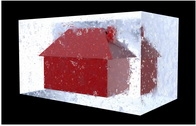Advertisement
Value Nation: The mortgage meltdown and appraiser selection

Within the past couple of years, we have experienced a complete meltdown of our economy, the mortgage industry and our banking system. As a result, we have witnessed wholesale changes in the way appraisals are purchased. Mortgage brokers, loan officers and anyone else with a financial interest in a transaction are unable to purchase appraisals.
This requirement has been imposed by Fannie Mae, Freddie Mac and the Federal Housing Administration (FHA) on all loans, either purchased or made by them. In today’s market, that represents most, if not all, of the mortgage loan market. In the past, Wall Street was buying loans, but that practice has ground to a halt due to all of the bad loans. As a result, federally-backed mortgages are practically the only game in town.
There has been much complaining by mortgage brokers, loan officers and even Realtors and appraisers over this new practice. Unfortunately, the change comes at a time when loan volumes are in the gutter, property values are in the tank, home foreclosures are at an all-time high, and the overall economy is on the ropes. When we combine all of these factors, it makes the origination of a marginal loan difficult, to say the least. Some say that these marginal loans should not be made; others say that these circumstances make appraisers less accountable.
Many have complained about this new process and the new rules. Is it likely to change, or are we stuck with a system where lenders and Realtors are not going to be able to select and or communicate with appraisers in the future?
Before determining the answer, we must consider the fact that our entire financial system was in danger of going down the tubes as a result of the mortgage meltdown. Practically everyone in our society was damaged in one way or another by the collapse of the system, and, like it or not, most of the problem stemmed from toxic mortgages. Due to this catastrophic failure of the system, our political leadership cannot and will not take this problem lightly. While there is sufficient blame to go around, the consensus of opinion is that inflated appraisals were largely to blame for the crack in the monetary system. It will not be easy going forward for regulators and politicians to relax appraisal procurement rules set in place by Fannie, Freddie and the FHA. Specifically, what may we expect in this regard?
For starters, there is likely to be a tightening of the mortgage system in months to come like we have never seen. Interest rates are going to increase, mortgage qualification requirements will continue to be rigid for many would-be borrowers, and appraisal scrutiny will be tougher, not lighter.
The powers that be are currently saying that the root of the problem is appraiser pressure being imposed by those selecting appraisers, purchasing appraisals and reviewing appraisals and that these are the very people standing to gain by collecting fees from the closing of the loan transaction. Further, appraisers, in some cases, are accused of collecting fees on appraisals, which they inflate just to insure that the loan closes and of continuing to get business from the people who hired them. Even when it is not true, the perception is there, and, because of this, it will be hard for regulators and legislators to allow business as usual.
In conclusion, it is not fair to any of the self-respecting professionals concerned, including lenders, appraisers and Realtors, to be subjected to the temptation to commit fraud or to be positioned where the perception would be that they are acting in a less-than-professional manner. Neither is it fair to the taxpayer for there to be a door for industry participants to practice business in such a way that the taxpayer is on the hook to cover the cost of avoidable bad loans. Nor is it fair to the borrower to pay for an appraisal and a loan whereby he or she is exposed to foreclosure due to unscrupulous business practices.
Finally, it is not fair to the regulators, who must enforce rules, to be put in a position where there is opportunity for fraud on their watch. Given all of the reasons above, stricter rules are not only likely to be implemented, but they are also necessary to protect a system from which we all benefit from as professionals.
If these rules eliminate a few bad apples, so be it. In the past, the bad apples had the advantage of siphoning off business from those who follow the rules. Under today's new system, the playing field is level and the ethical professionals will enjoy the business provided by our industry, without being put in a position of their having to subscribe to the same underhanded tactics of the less-than-ethical practitioners in order to earn a living.
Yes, stricter rules will come at a price, but it is worth the investment. It is a necessary cost of doing business and it will serve to protect all of society from the type of catastrophic events that we have experienced and are experiencing. Going forward, appraisers must continue to be insulated from the pressure of those having a financial interest in loan transactions.
Charlie W. Elliott Jr., MAI, SRA, is president of Elliott & Company Appraisers, a national real estate appraisal company.
About the author




